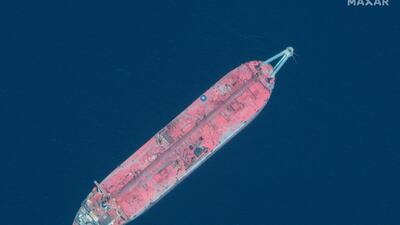The UN on Thursday said its mission to repair a decaying oil tanker stranded in the Red Sea off the coast of Yemen is running out of money, blaming the Iran-backed Houthi rebels for delays and rising costs.
Reena Ghelani, a senior UN aid official, told the Security Council that the long-planned expedition to the FSO Safer was "running out" of cash because the departure date had been pushed back so many times.
The Houthi rebels, who control the coastline near the vessel, approved the UN mission in November but later reneged.
There are fears that the tanker could rupture and spill its million-barrel load into the sea.
“The UN expert team remains ready to deploy as they have been for the last two years,” Ms Ghelani said.
"The UN will keep that team on standby for as long as we have donor funding to do so. Some of those funds, however, will start running out soon.”
More than $3.35 million has already been spent on hiring engineers and leasing ships and gear to launch the repair mission from Djibouti.
The costs increase each time the mission is delayed.
The world body wants engineers to be able to inspect the vessel, carry out light repairs and return later for a more comprehensive job.
But the Houthis want more work completed in the initial visit, Ms Ghelani said.
“Over the last 10 days, there have been extensive discussions to try to bridge the remaining gaps. But so far, these efforts have not succeeded."
The 45-year-old FSO Safer has been stranded eight kilometres south-west of the Ras Isa oil terminal, 60km north of the Houthi-held port of Hodeidah, since 2015, when the rebels took control of the coastal area.
Experts say the vessel could rupture at any moment and release 1.1 million barrels of oil into the sea, in a maritime disaster that would be four times worse than the 1989 Exxon Valdez spill near Alaska.
A major spill would hurt tourism, fishing and desalination plants across Yemen, Saudi Arabia, Israel, Jordan, Egypt, Sudan, Eritrea and Djibouti.
It would impede a shipping lane through which as much as 10 per cent of global trade passes.
Britain’s UN ambassador, Barbara Woodward, later said she hoped talks in New York would “put enough pressure on the Houthis” to let the mission proceed and avert an “environmental disaster”.
Analysts say the Houthis want the FSO Safer in place to profit from its cargo and future oil sales, and as a deterrent for any seaborne assault by foreign forces.
Jennifer Morgan, executive director of Greenpeace International, urged the UN’s 15-nation council to act now and prevent a catastrophe that could affect millions.
“The political deadlock must be broken and the international community has to find a swift peaceful resolution to access the rusting oil tanker,” Ms Morgan said.
“The risks of devastation are increasing with every passing day of inaction."


